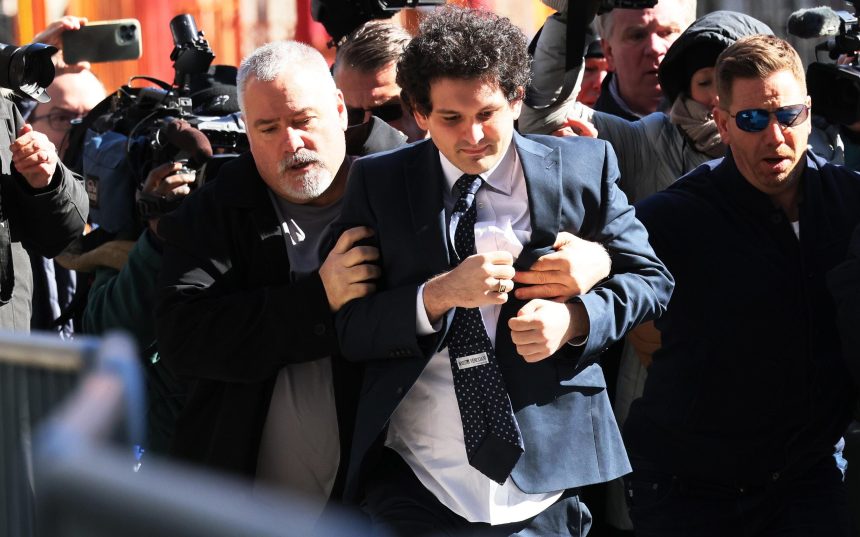At his peak, Sam Bankman-Fried had celebrities lining up to endorse and invest in his crypto exchange platform, FTX, including supermodel Gisele Bündchen, Larry David, Tom Brady, and more. From a two-bedroom Airbnb in Berkeley, he built a business five years later was valued at $32 billion, when cryptocurrency prices were close to all-time highs. With the headquarters moved to the Bahamas, the likes of Blackrock and Softbank lined up to invest, while Bankman-Fried rubbed shoulders with politicians and celebrities including Bill Clinton and Shaquille O’Neill. But the crypto king then fell from grace, and set a record for losing more money in one day than anyone else. He is likely to find himself amongst a slightly different crowd as he faces decades behind bars, having been found guilty by a New York federal court on all seven charges for fraud and conspiracy that were filed against him. Bankman-Fried had used customer funds for his own risky investments and spent millions, taken from deposits, on a luxury lifestyle and political donations. US attorney Damian Williams said in a statement after the verdict, “Sam Bankman-Fried perpetrated one of the biggest financial frauds in American history.” Corporate scandals come in all shapes and sizes. And all can have a huge impact on the individual and their business. An expensive joke Just ask British businessman, Gerald Ratner. Ratner built and ran a successful chain of jewellers during the 1980s: The Ratner Group. The shops and products were extremely popular with the public until 1991, when Ratner delivered a speech at a conference of the Institute of Directors in which he said: “People say, ‘How can you sell this for such a low price?’ I say, ‘Because it’s total crap.’” It is hard to find a business expert who recommends a CEO to disparage their own products. But Ratner didn’t stop there. He went on to say that one of their products was “cheaper than a prawn sandwich from Marks and Spencer’s,” and that, “the sandwich will probably last longer”. Ratner’s comments became textbook examples of how CEOs need to choose their words carefully and coined the phrase, doing a Ratner. In the aftermath, the value of the Ratner Group plummeted by around £500 million, nearly resulting in the group’s collapse. But the group made some changes and recovered from Ratner’s gaffe. In 1992, a new company chairman was instated, Ratner was dismissed as CEO, and the Ratner Group changed its name to Signet Group in 1993. Currently branded Signet Jewelers, they are now the world’s leading retail jewellery specialist with a market value of up to £4bn. “Ratner and his persona were the company’s brand in many respects,” explains Dr Elizabeth Dempsey, Senior Lecturer in Marketing at Sheffield Business School. “He was a very likeable and down-to-earth character and that resonated with his target customers. Person branding can be an effective strategy as it brings the brand to life, giving it human-like qualities, which connects well with its audience. It can make a brand seem more interesting and authentic. But Dr Dempsey points out that a brand is innately tied to the person and their actions. “Ratner caused his brand problems not only because he made comments that suggested his customers were fools but also because his name itself dragged the brand down with him.” Elon Musk is learning the hard way not to insult customers, but not insulting your own company’s products is a great first place to start. But specific decisions made by the new company chairman in the aftermath may have been vital to Signet Jewelers’ survival. The importance of trust Dr Yuri Mishina, Associate Professor of Organisational Behaviour and Strategy at Imperial College Business School, explains that when a scandal hits, there is an immediate need to limit damage to prevent losing the trust of the public. Using a data set of earnings re-statements collected by Professor David Gomulya from Singapore Management University, they evaluated how companies attempt to recover from scandals. They found that investors were more willing to forgive a company if changes were made to the top management team. It can be difficult for stakeholders or members of the public to see if necessary changes have been made as they’re not privy to all the internal workings, but a change of CEO is highly visible. The CEO is often seen as the personification of the organisation, and changing the person in the corner office is considered a major action as any new CEO would be taking a risk in accepting the job, putting their own reputation on the line. The willingness to take this risk suggest that more substantive changes may have been made throughout the organization. In Mishina and Gomluya’s study, once a company made such changes, investors started trusting it again. So, letting Ratner go may have been what saved the former Ratner Group, and allowed Signet Jewelers to continue and become the world’s leading retail jewellery specialist. In fact, Dempsey believes this move could have been made in response to earlier signs of recklessness from Ratner: “Senior management could have removed Ratner from his position as soon as any signs of hubris or risky behaviour emerged; this was not the first time he told these jokes and he was probably just lucky in the past.” While Dr Mishina and Prof Gomulya explored how firms respond to scandal, how do individual professionals respond? Bad judgement or a lack of morals Professor Federica Pazzaglia from UCD College of Business and colleagues investigated how banking professionals who testified during a government enquiry into the 2008 banking crisis responded when confronted with personal criticism of their judgement, competence, and morality. Facing criticisms of their judgement, the bankers would admit to previous instances of poor judgement, but rationalised those decisions as a product of a shared past mindset that characterised the profession at the time. “There is consensus that professional credibility and trust can be rebuilt slowly as long as one’s integrity is not in question,” Professor Pazzaglia explains. “In current business environments that are complex, interconnected, and high-velocity, organizations and individuals are required to make strategic decisions rapidly and with incomplete, often contradictory information.” She notes that they are also required to abide by evolving societal trends and pressures. “In these circumstances, admitting to bad judgment is not seen as a sign of bad character, but rather as an admission of a bad decision or a mistake, one that can be attributed to external factors.” In contrast, the bankers were more wary when their competence was criticised, deflecting onto other professional groups and showcasing the positive outcomes of their own work in the wake of the crisis. While a bad judgement may be viewed as a singular event, perceived lack of morals could lead to expectations of future immoral behaviour. The bankers rejected criticism of their morality by attributing the crisis to unforeseeable circumstances. They pointed the finger at broader market forces beyond anyone’s control and expressed compassion for victims of the crisis. Try telling that to people who lost their homes. But the underlying thinking is that criticism of judgement is perhaps easier to take as it can be presented as a one-time problem, while claims of incompetence or bad morals are likely to be perceived as indicators of bad character. The Bankman-Fried case has been closely followed by all the major news outlets, and from there it has spread across social media platforms. In the case of the UK’s Gerald Ratner, his comments were made over 30 years ago, long before X, Facebook and Linkedin. So, how have reactions to scandals changed? “It is easier for audiences to respond to scandals and share their views in the age of social media,” explains Elizabeth Dempsey. “Audiences can take direct action by unfollowing public figures and even ‘cancel’ them all together. However, they are not subject to the mass media lens in the same way Ratner was; to some extent the audience can make their own mind up and the public figure has more control over the messages they convey post scandal.” “Public figures don’t necessarily take any further or different action to protect their reputation but they do have full control over the communications they can send to audiences in a way that they would not have had in the past.” For Dr Dempsey, this control means they are more capable of managing the impressions they make on their audiences and carefully crafting their persona but are agile in adapting that persona if and when they need to. “We have seen this unravel to some extent with influencer Nella Rose on ‘I’m A Celebrity.’ She no longer has control over the editing of her content and thus a potentially different persona emerges, perhaps one more aligned to her authentic self.” Something to think about before “doing a Ratner.”



